In the world of healthcare, cancer remains one of the most daunting adversaries, known for its complex nature, high mortality rate, and severe impact on individuals and societies. Characterized by the rapid and uncontrolled growth of abnormal cells, cancer manifests in various forms—each unique in symptoms, progression, and severity.
The disease’s pervasive nature means that nearly every organ in the body can be affected, with signs ranging from fatigue and weight loss to skin changes, unusual bleeding, and persistent pain. While treatments have advanced significantly, our understanding of cancer’s origins underscores a sobering truth: much of what predisposes people to cancer may be woven into the very fabric of lifestyle and environmental factors.

Central to these risk factors is diet and nutrition. The growing evidence surrounding the link between what we consume and our susceptibility to cancer has prompted health authorities worldwide to rethink dietary guidelines.
As Asim Javed, the Director General of Punjab Food Authority (PFA), recently emphasized, “A nutritious diet is not just a lifestyle choice; it is a strategic decision in cancer prevention. We are seeing more and more evidence of how dietary habits can mitigate, or exacerbate, cancer risks.”
The Burden of Cancer: A Global and National Perspective
Globally, cancer rates continue to climb. The World Health Organization projects that by 2025, new cases will reach nearly 19.3 million, with 10 million additional lives lost to this disease each year. The demand for strategies that not only treat but prevent cancer has never been more critical. In Pakistan, the cancer burden is particularly alarming, with GLOBOCAN 2020 statistics revealing over 178,000 new cancer cases and 117,000 cancer-related deaths annually. The cumulative toll of cancer over the past five years amounts to a staggering 329,547 cases.
In a nation where access to healthcare is uneven and cancer treatments are prohibitively expensive for many, the significance of prevention cannot be overstated. Poor nutrition, compounded by high consumption of junk foods and harmful substances like gutkha and paan, further elevates the risk of cancer in Pakistan. A 2018 national nutrition survey highlighted widespread deficiencies in crucial nutrients—vitamin D, vitamin A, zinc, and iron—all of which play a role in maintaining cellular health and potentially warding off cancer.
“The food choices we make daily are not isolated decisions; they accumulate into life-changing health outcomes,” Asim Javed from the PFA pointed out. “As an organization, we are committed to addressing these issues head-on by promoting healthy eating habits, regulating food quality, and educating the public on the link between diet and chronic illnesses, especially cancer.”
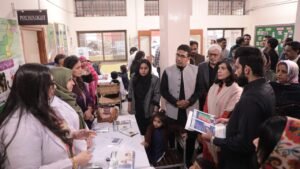
Understanding the Diet-Cancer Connection
The relationship between diet and cancer is not a new discovery, but the depth of this connection continues to unfold through ongoing research. Cancer can result from a complex interplay of genetic, environmental, and lifestyle factors. Among these, dietary habits are particularly influential because they either support cellular health or, conversely, introduce substances that can initiate or promote cancerous growths.
Diets rich in ultra-processed foods, high sugar, unhealthy fats, and red or processed meats have been linked to a heightened risk of several cancer types. Conversely, diets centered on plant-based foods and lean proteins can offer a protective effect. This is because plant-based foods contain various bioactive compounds known as phytochemicals, which have shown potential cancer-protective properties.
For example:
•Lycopene, found in tomatoes, grapefruit, and watermelon, is linked to a reduced risk of prostate cancer.
•Anthocyanins, present in berries, grapes, and plums, are powerful antioxidants that protect cells from damage.
•Carotenoids (like alpha and beta-carotene in carrots and pumpkins) play a role in immune function, which is critical in identifying and combating abnormal cells.
•Sulforaphanes and indoles in cruciferous vegetables like broccoli and cauliflower have been shown to inhibit tumor growth.
These phytochemicals may influence cancer development at multiple stages, from protecting DNA integrity to reducing inflammation and enhancing the body’s detoxification systems. Although the exact mechanisms are still being studied, the patterns are clear: a diet filled with nutrient-dense, plant-based foods appears to be a formidable ally in cancer prevention.
Nutrition as Supportive Care in Cancer Treatment
For those already diagnosed with cancer, nutrition continues to play an indispensable role—not only in supporting general health but also in minimizing the adverse effects of treatments like chemotherapy and radiation. These treatments, while targeting cancer cells, often compromise the body’s overall strength, leading to side effects such as nausea, fatigue, and weakened immune responses.
A well-tailored diet can alleviate some of these symptoms and enhance patients’ resilience to treatment. For instance, bland, high-protein foods like yogurt, cottage cheese, and poached eggs may be easier to consume before and after chemotherapy sessions. Patients are encouraged to avoid acidic or spicy foods, which can irritate the digestive tract, and to stay hydrated with non-acidic juices and herbal teas that soothe the stomach.
During chemotherapy, small meals spread throughout the day rather than three large meals can help patients manage their appetite, while cold foods may offer relief to those experiencing heightened sensitivity to smells. Maintaining hydration is crucial, as fluids aid in flushing out treatment byproducts and preventing dehydration—a common issue during intensive cancer therapies. “The goal is to offer nutrition that aligns with the body’s needs at every stage of the treatment journey,” says Asim Javed. “This way, we can help patients maintain their strength and improve their quality of life throughout the healing process.”
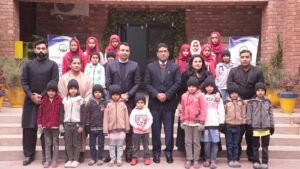
Steps Forward: The Role of Punjab Food Authority
Recognizing the urgent need to raise public awareness about the impact of diet on cancer prevention, the Punjab Food Authority has launched a range of initiatives aimed at promoting nutritional literacy and healthy eating. Through community seminars, social media outreach, and targeted educational campaigns, the PFA’s Nutrition Section is actively engaging the public, educating them about the potential risks of poor dietary choices and the preventive benefits of balanced nutrition.
Camps and workshops organized by the PFA provide practical guidance on how to incorporate cancer-fighting foods into daily meals. Additionally, social media platforms have become valuable tools for the PFA, allowing them to reach younger audiences through informative reels and infographics. These efforts are not only creating awareness but are also fostering a culture that prioritizes health-conscious decision-making.
National Action Plan: A Coordinated Effort
The Punjab Food Authority’s efforts align with Pakistan’s broader National Action Plan on Non-Communicable Diseases (NCDs), which seeks to address the country’s rising burden of chronic illnesses, including cancer. By investing in preventative measures and early interventions, the NAP is working towards a long-term solution to reduce cancer prevalence. However, implementing these strategies requires more than just government initiatives. A coordinated effort involving healthcare providers, educational institutions, community leaders, and media is essential to instill lasting changes in the population’s dietary habits.
The NAP’s initiatives include school programs to educate children on healthy eating, workplace wellness campaigns to promote nutritious foods, and collaborations with healthcare providers to integrate dietary counseling into routine care. The ultimate goal is to empower individuals with the knowledge and resources to make informed dietary choices that enhance their overall well-being.
The Way Forward
As Pakistan grapples with its growing cancer burden, the need for a shift in the national approach to health and nutrition is clearer than ever. While cutting-edge treatments and advanced diagnostic technologies are essential, they are only part of the solution. Real progress lies in addressing the root causes—many of which can be mitigated through preventive measures like proper diet and nutrition.
In an era where non-communicable diseases are becoming increasingly prevalent, building a national culture of health literacy and preventive care is not merely a health objective; it is a socioeconomic imperative. The PFA’s commitment to this mission, as seen in its educational outreach and regulatory actions, is a step in the right direction. But more needs to be done. Public health messaging must reach every corner of society, from urban centers to rural villages, to create a unified response to cancer prevention and health preservation.
Dietary choices hold significant power over our long-term health. From cancer prevention to supportive care, a focus on nutrition can profoundly impact individuals and communities. As Asim Javed, Director General of the Punjab Food Authority, aptly stated, “Preventing cancer begins on our plates. Every meal is an opportunity to make choices that protect and sustain life.” With continued dedication to promoting nutritional awareness and addressing dietary risks, Pakistan can build a healthier future and reduce the immense burden that cancer places on its people.





 United Arab Emirates Dirham Exchange Rate
United Arab Emirates Dirham Exchange Rate

